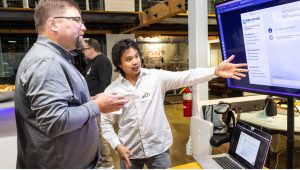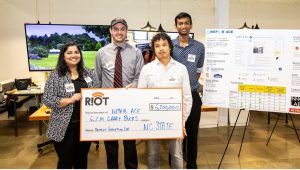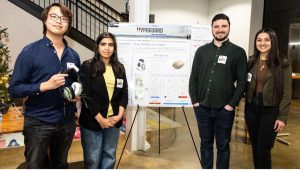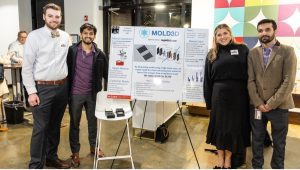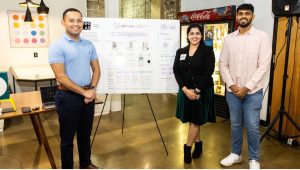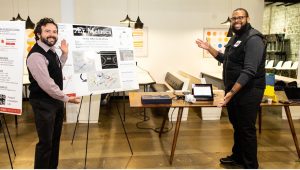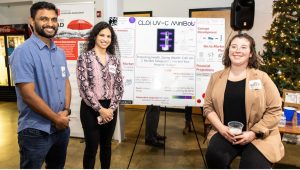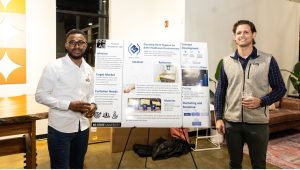On Tuesday, December 12, graduate students, including two Joint BME team members from NC State’s Product Innovation Lab, gathered at Raleigh Founded to showcase innovative projects to the Triangle’s innovation and startup community.
This article was edited for relevance to Joint BME. It was originally published by NC State Jenkins MBA News on December 20, 2023, and can be read here.
A student from the audience-favorite Repair Ace team demonstrates the product to event attendees.
Recognized by Forbes magazine as one of the most innovative business courses in the country, the Product Innovation Lab brings together multidisciplinary teams of management (MBA) and engineering graduate students to research market needs and develop cutting-edge solutions. During the course, which is co-taught by NC State faculty members in Poole College of Management and College of Engineering, students dive deep into customer discovery and then collaborate to prototype innovative solutions and develop viable go-to-market strategies.
“This kind of interdisciplinary collaboration allows students to define the ‘right’ market problem to solve and then design innovative solutions that really deliver for the users and customers,” says Jonathan Bohlmann, professor of marketing and innovation at Poole College of Management and one of the course instructors.
The lab culminates in an end-of-semester showcase held in partnership with RIoT, an Internet of Things (IoT) community hub, where students practice pitching their products to audience “investors” and network with professionals in the startup community. This year’s showcase included seven student projects – each designed to leverage cutting-edge technology, tackle complex problems and tap into market needs.
During the showcase, attendees had the opportunity to vote for their favorite projects with mock “investor dollars.” Secret judges in the audience – including Jason Mann, vice president of IoT at SAS, Emily Lofton, business analyst at investment firm Woven Integration, and Rachel Newberry, program director for RIoT – also evaluated the projects and weighed in with expert insights. “We had a particularly keen ear toward those who could tell us about their customer discovery,” Newberry said.
REPAIR ACE
REPAIR ACE, developed by electrical and computer engineering (ECE) student Marc John Sebastian and Jenkins MBA students Eric Azares, Kalindi Kapadia, Brian Kelly and Mars Spriggs, was the audience favorite – receiving $6.2 million in mock “investor dollars.”
With a ChatGPT-like interface, the application provides DIY steps and time and cost estimates for a number of appliance and home repair issues, like how to replace a worn dishwasher gasket. “We put AI back into repair,” said Azares about the project. “Our AI-powered web application allows homeowners to get answers to questions about repair issues around their home, which helps them save money and time on home repairs.”
Hypoguard
A second audience favorite was Hypoguard, a hypoxia-detection system developed by ECE graduate student Yi Chen, biomedical engineering (BME) student Masod Sadipour, textile engineering student Sarah Park and Jenkins MBA students Khushboo, Kane Roland and Ranine Haidous.
Designed to promote aviation safety, the wearable device provides real-time monitoring of oxygen deprivation and enables pilots to take action prior to hypoxia onset. For Haidous, the Product Innovation Lab was the first interdisciplinary class she has taken at NC State – and a great opportunity to interact with the university’s diverse graduate students. “This project challenged me to develop a technology solution while also maintaining consumer data privacy in the process.”
MOLD3D
The judges’ favorite project was MOLD3D, a 3D-printing system for injection molding. The solution was developed by engineering management (MEM) students Izhan Ansari and Lakshmi Sivakumar, ECE student Hussain Askari and Jenkins MBA students Andrew Clark, Kate Hedgecock and Avery Stemper.
With the ability to craft low-cost custom molds in days, MOLD3D serves entrepreneurs by enabling rapid prototyping. “They identified a very narrow problem in the market to solve,” Newberry said.
pill mate
The judges’ second favorite, pill mate, serves those managing multiple medications with an AI-powered medication dispenser. The project was developed by industrial and systems engineering (ISE) student Mengyang Wei, MEM student Meha Saluja and Jenkins MBA students Dino Guallpa, Akash Kaliramana, Yash Patel and Raquel Peters.
Integrating advanced technologies, such as facial recognition, pill mate simplifies medication adherence for individuals and caregivers. The product also provides reminders and health insights to optimize customers’ health management.
Ær Metrica
To protect consumers from the adverse effects of air pollution, Jenkins MBA students Tyrique Gaines, Deion Doubledee and Israel Dias – along with ECE student Akhil Athawale, mechanical engineering student Tiansong Wang and mechanical engineering and ECE student Zeheng Xu – developed Ær Metrica.
Monitoring air quality inside and outside vehicles, the air pollution detector automates onboard systems and improves cabin air quality – leading to better quality of life for a range of consumers, including at-risk populations like those with respiratory diseases.
According to Doubledee, the course was a unique opportunity to dive deeper into product design. “We focused a lot on viability, desirability and feasibility – if you don’t have those three things, that’s a problem.”
CLOi UV-C MiniBot
Another project focused on maximizing health and human safety is CLOi UV-C MiniBot – a UV-C-powered disinfection solution developed by microbiology student Kelsey McKay and Jenkins MBA students Blake Finkenbeiner, Sukumar Ponram, Isabella Riley and Arpana Roy.
Designed to promote patient safety and drive cost savings for hospitals, CLOi UV-C Minibot aims to reduce healthcare-associated infections. Additionally, the product is a simple-to-operate, affordable alternative to other disinfection solutions.
Manus Band
Manus Band, a monitoring tool ensuring optimal hand hygiene, is another product designed to protect patients and healthcare workers by reducing healthcare-associated infections. The solution was developed by ECE student Sahil Bendale, BME student Yousif Shwetar, MEM student Nilesh Pranay and Jenkins MBA students Humphrey Okeke, Yeimi Tomas and Jared Vallner.
According to Vallner, the opportunity to pitch the product at the end-of-semester showcase was particularly rewarding. “The showcase was a really cool experience with a lot of concept validation,” he said. “I got to speak with someone who told me about a company in Denmark that is developing a very similar thing as Manus Band, which said a lot about the viability of our design.”



